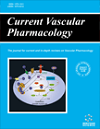-
s Statins and Venous Thromboembolic Disease - Where are we Now?
- Source: Current Vascular Pharmacology, Volume 22, Issue 4, Jul 2024, p. 297 - 300
-
- 01 Jul 2024
Abstract
Classical risk factors for atherosclerosis also play a role in the pathogenesis of venous thromboembolism (VTE). Low-density lipoprotein cholesterol has prothrombotic and endothelium- deteriorating effects which are not limited to the arterial system. The association between hypercholesterolemia and VTE has been established, but the benefits of statins in the prevention of VTE assessed by observation studies seemed equivocal. The large, randomized trial Justification for the Use of Statins in Prevention: an Intervention Trial Evaluating Rosuvastatin (JUPITER) recorded the occurrence of VTE as a protocol-specified endpoint and reported a reduced incidence of VTE among subjects taking 20 mg of rosuvastatin daily vs placebo (hazard ratio 0.57; 95% confidence interval 0.37-0.86; p=0.007). Similar results were confirmed by meta-analyses of observation studies and randomized trials. Recently, a Mendelian randomization study that took the presence of gene variants coding for less efficient hydroxymethyl-glutaryl coenzyme A reductase activity as a proxy for statin treatment, confirmed a small, but significant negative association between the score of selected genetic polymorphisms and the incidence of VTE. However, since the protective effects of statins are limited, they should not be substituted for guideline-recommended VTE prophylaxis or anticoagulation treatment.


